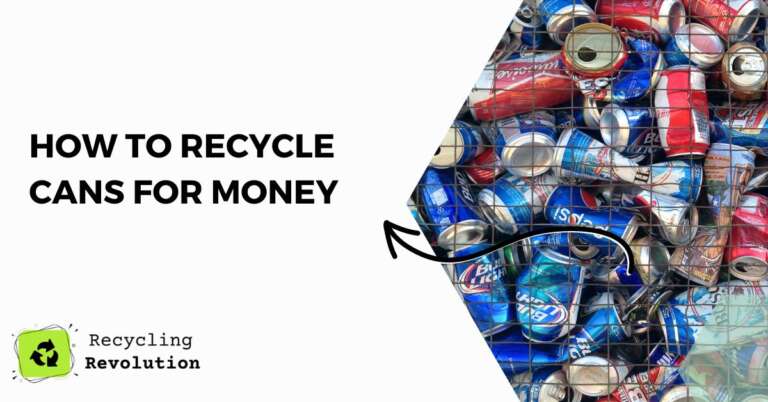In the grand orchestra of waste management, each one of us plays a crucial role. One such role is recycling, a symphony of sustainability that can convert trash into treasure – quite literally when it comes to recycling cans for money.
With some elbow grease, a keen eye for detail, and a dash of perseverance, you can turn your discarded cans into a source of income.
Not only will you be lining your pockets with some additional change, but you’ll also be making a significant contribution to environmental conservation.
TL;DR: Recycling cans for money is not only eco-friendly but also a way to make some extra cash. It involves collecting cans, sorting them, crushing them if possible, locating a recycling center, and finally, trading them in for cash. Remember to check local recycling regulations to ensure compliance.
A Roadmap to Recycling Cans for Money
Step 1: The Art of Collection
Recycling is a numbers game. The more cans you can collect, the more money you’ll likely make. I recommend starting your can collection at home. Aluminum soda, beer, and other beverage cans are commonly used items that are perfect for recycling.
Note: Do not neglect to ask friends, family, or even your workplace if you can take their unwanted cans off their hands. You may be surprised how quickly your collection grows!
Step 2: Sorting the Treasure Trove
Once you have amassed a sizeable collection, the next step is to sort them. This process is essential as recycling centers usually pay by the type of can – aluminum cans typically fetch a higher price than steel ones.
Tip: You can use a magnet to help sort your cans. If the magnet sticks, it’s steel. If not, you’re likely holding an aluminum can, which is more valuable.
Step 3: Crushing the Cans
After sorting, consider crushing your cans. While this step is not mandatory, it does help save space, making transportation easier. There are various tools available for this purpose, ranging from manual can crushers to more advanced automatic ones.
Step 4: Locating a Recycling Center
The next step is finding a recycling center. An online search for “can recycling centers near me” should provide a list of options in your vicinity. Some states offer a recycling program where they pay per can, making them a more profitable option.
Step 5: Cashing In
Finally, it’s time to cash in. Pack your cans and head to the recycling center. Most centers will weigh your cans and pay you based on the current market rate for the metal.
Ensure to collect your receipt as it contains information about the total weight and price per pound of your cans.
Note: It’s always a good idea to clean your cans before recycling. Not only does this make them more acceptable to recycling centers, but it also helps prevent any unpleasant odors during collection and storage.
To Break it Down
| Steps | Description |
|---|---|
| Collection | Gather cans from home, friends, family, and workplaces |
| Sorting | Separate cans by type (aluminum vs. steel) |
| Crushing | Crush cans to save space (optional) |
| Locating a Recycling Center | Search for nearby recycling centers or programs |
| Cashing In | Take cans to the center, get them weighed, and receive payment |
The Untapped Potential: Exploring More Avenues for Can Collection
While collecting cans at home, from friends, and family is a good start, it’s merely scratching the surface of the potential can collection universe.
I recommend venturing into public spaces, local businesses, or events where canned drinks are sold or consumed in large quantities.
You can speak to the management of local sports complexes, concert venues, fairs, or parks to understand their recycling program. If they don’t have one, propose an arrangement to collect their discarded cans.
Additionally, consider liaising with local restaurants, cafes, or bars that might be willing to contribute to your cause.
Sort, but Do Not Mix!
In your enthusiasm to sort cans, ensure that you don’t mix different types of metals together. The value of the scrap decreases when different metals are mixed together.
This could also lead to recycling centers rejecting your cans altogether. Always make sure to keep different types of cans in separate bags or containers.
Note: Recycling centers may reject cans with excessive dirt, food, or other contaminants. To prevent this, rinse your cans and let them dry before crushing or storing them.
Ready, Set, Crush!
When it comes to crushing cans, consider investing in a can crusher if you plan on making this a regular endeavor. While there are plenty of inexpensive options available, those who intend to recycle cans frequently or in larger volumes might find that an automatic or semi-automatic can crusher is a worthy investment.
This tool not only saves time and effort but also helps you store and transport more cans, thereby maximizing your returns.
Recycling Centers and the Green States
In some states, can recycling for money is more profitable thanks to the Container Deposit Legislation, also known as Bottle Bill. These “Green States” offer a fixed 5 to 10 cents per can, which can add up quickly if you’ve amassed a sizeable collection.
If you’re lucky enough to reside in one of these states, you might find your earnings significantly boosted.
From Waste to Wealth: It’s All About Patience and Persistence
Recycling cans for money is not a get-rich-quick scheme. It requires patience, time, and a fair amount of effort. However, if you approach it with the right mindset, it’s an excellent way to contribute to environmental sustainability while making some extra money.
Also, consider building relationships with your chosen recycling centers. Regular visits and timely delivery can lead to preferential rates and better service. You could also check if they have any special rates or discounts during specific periods or for larger volumes.
Think Outside the Can
Recycling goes beyond just cans. Most of the principles discussed here can also apply to bottles, paper, and many other recyclable items. Once you’ve mastered cans, consider expanding to other recyclable materials. Remember, every bit counts towards your wallet and our planet!
Know Your Local Laws and Regulations
It’s important to keep in mind that recycling regulations can vary greatly from one location to another. Some places may have restrictions on what can be recycled, or specific rules about can preparation (such as removing labels, crushing, etc.).
Always make sure you’re up to date with your local regulations to avoid potential fines or wasted effort.
Encouraging Others: Spreading the Recycling Culture
Last but not least, don’t keep this money-making secret to yourself. Encourage others to recycle cans, not just for the financial gain but for the environmental benefits it brings.
Schools, community centers, and local organizations are great places to start a can recycling drive. Together, we can make a bigger impact!
Conclusion
Recycling cans for money is an activity that pays in more ways than one. It offers financial gain, promotes resource conservation, and inspires environmental stewardliness. It’s a perfect example of how a small personal effort can create significant societal benefits.
Remember, in the eco-system of sustainability, every can counts!
FAQs
How much can I earn from recycling cans?
This depends on several factors like the type of can, the weight, and the current market rates for the metal. Aluminum cans could fetch anywhere from $0.20 to $0.35 per pound.
Is it necessary to clean the cans before recycling?
While it’s not mandatory, it’s certainly recommended. Clean cans are less likely to attract pests and don’t emit any unpleasant odors.
How can I identify the type of can I have?
A simple magnet test can help. If a magnet sticks to your can, it’s likely steel. If not, it’s probably made of aluminum, which is more valuable.
Are there other items I can recycle for money?
Absolutely! Many items, such as electronics, scrap metal, ink cartridges, and even cooking oil, can be recycled for money. Always remember to check local rules and regulations for recycling these items.

